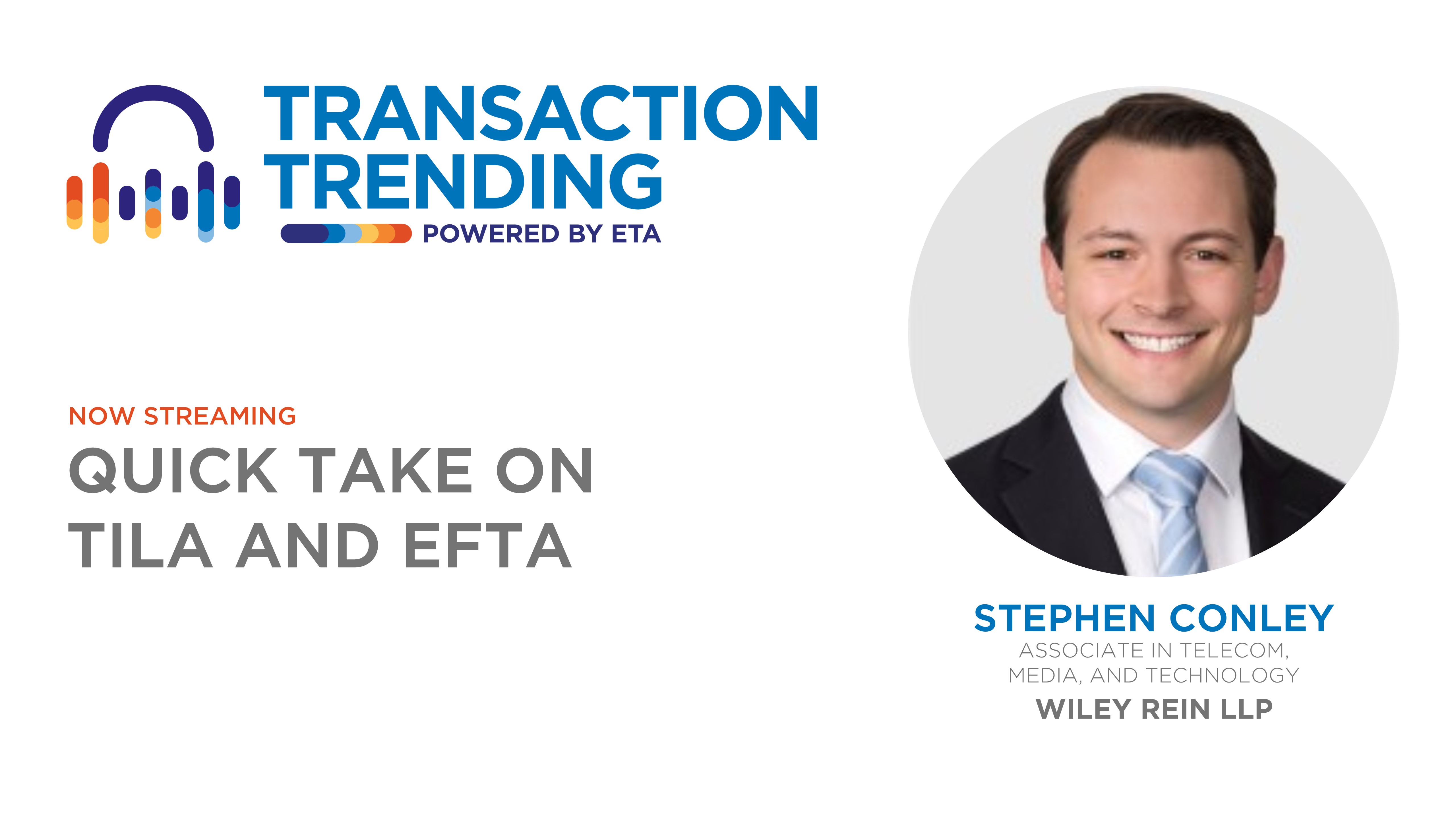Transaction Trending: Quick Take on TILA and EFTA

In a recent interview, Stephen Conley, Associate at Wiley, shared valuable insights on two crucial laws that shape the landscape of consumer finance in the United States: The Truth in Lending Act (TILA) and the Electronic Fund Transfer Act (EFTA). In the conversation, Conley sheds light on these laws, their implementing regulations, and the challenges financial institutions face in maintaining compliance. To hear the complete interview please follow this link. While reading this article or listening to the interview, please keep in mind that this conversation does not construe legal advice and is meant for general information only.
The Basics: TILA and EFTA
Conley explained that TILA, enacted in 1968, aims to ensure that credit terms are disclosed to consumers in a clear and understandable manner. It’s implemented through Regulation Z (Reg Z) and applies broadly to individuals and financial institutions offering credit. The key here, Conley pointed out, is that the credit must be subject to a finance charge or payable by written agreement in more than four installments, and it must be primarily for personal, family, or household purposes.
EFTA, came into play a decade later in 1978. Its purpose is to create protections for consumers using electronic banking and financial services. Regulation E (Reg E) implements EFTA, and it generally applies to all persons and entities in the US offering electronic funds transfer services.
Both of these acts underwent a significant change in 2011 when the Dodd-Frank Act transferred their rulemaking authority from the Federal Reserve Board to the Consumer Financial Protection Bureau (CFPB).
A Web of Regulations
One of the challenges Conley highlighted for financial institutions is that TILA and EFTA don’t exist in isolation. They intersect with several other regulations, including the Equal Credit Opportunity Act (ECOA), the Fair Credit Reporting Act (FCRA), and the Dodd-Frank Act’s prohibition on unfair, deceptive, and abusive acts or practices (UDAAPs). This creates a complex regulatory environment that financial institutions must carefully navigate.
Common Pitfalls
Conley pointed out several common compliance issues that financial institutions face. With TILA and Reg Z, frequent violations include failing to make proper disclosures before loan contract signing, engaging in inaccurate credit billing practices, and not considering a consumer’s ability to repay when opening credit card accounts or raising credit limits.
For EFTA and Reg E, Conley mentioned common problems involve not promptly investigating errors in electronic fund transfers, failing to provide provisional credit within the required timeframe, and denying consumer claims without proper investigation.
The Changing Landscape of Payments
Conley also touched on how these regulations are adapting to new payment methods. Buy Now, Pay Later (BNPL) services, for instance, have recently come under the CFPB’s scrutiny, with a new interpretive rule bringing them under Reg Z compliance. He also mentioned a proposed rule that might classify certain Earned Wage Access (EWA) products as consumer credit offerings under Reg Z.
Interestingly, while the CFPB hasn’t yet applied EFTA and Reg E to cryptocurrency companies, Conley mentioned a court case where cryptocurrencies were considered “funds” subject to EFTA. This suggests that the regulatory landscape for digital currencies is still evolving.
To hear the complete in-depth interview please click here.
Stephen Conley will be on the panel on TILA/Reg E at ETA’s Payments Compliance Conference, Oct 29-30th, at The Ritz-Carlton, Pentagon City, VA. To learn the fundamentals of payments compliance we invite you to take our Payments Compliance 101 and Payments Compliance 201 courses [coming soon]. You can meet the experts and regulators at our annual Payments Compliance Conference.
Legal Disclaimer
The information provided in this blog post is for general informational purposes only and does not constitute legal advice. This content is based on a conversation with Stephen Conley and reflects his professional opinions and interpretations as of the date of the interview. Laws, regulations, and network rules regarding TILA and EFTA are subject to change. Readers should not act or refrain from acting based on this information without seeking professional legal counsel. Neither the author, Stephen Conley, Wiley Rein LLP, nor any affiliated entities assume any liability for actions taken or not taken based on the contents of this blog post.

